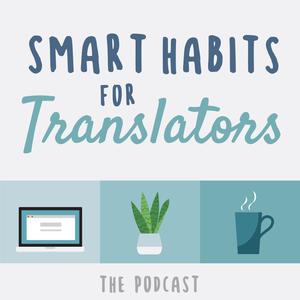
Smart Habits for Translators
Smart Habits for Translators
If you’re a translator who enjoys learning about habits to improve your business and lifestyle, then this is the podcast for you.
- Episode 88: Smart Habits for Better Work/Life Clarity—Our Last Episode!
Episode 88: Smart Habits for Better Work/Life Clarity—Our Last Episode!
In this last episode of our podcast, we’re touching on the topic that started Smart Habits for Translators more than four years ago—work/life clarity! If you missed the news, check out our previous episode where we explain why our podcast is coming to an end and what you can expect.
The concept of work/life clarity was what brought us together as co-hosts of Smart Habits for Translators, and it’s a topic we've addressed in many episodes of our podcast. We believe that striving for work/life balance is an unattainable goal while being clear about the priorities in your current season of life and business is a better way of identifying focus areas and setting boundaries.
Tune in to our last episode to hear our conversation on:
• What work/life clarity is and how it’s different from work/life balance
• How our understanding and approach to work/life clarity has evolved since we started our podcast
• What could be some signs to take some time to consider your own work/life clarity
• How to find work/life clarity
• How to set boundaries and priorities in your life and business intentionally
23 January 2024, 7:00 am - Episode 87: Smart Habits for Building and Changing Habits
Episode 87: Smart Habits for Building and Changing Habits
In this last episode of 2023, we’re sharing some important news about our podcast. After four years of producing Smart Habits for Translators, we’ve decided it’s time to wrap up the podcast, so this will be our second-to-last episode. Tune in to hear the reasons for our decision (spoiler alert—there’s no drama, and we’re still great friends!) and how you can continue to listen to our previous episodes after January 2024.
We decided to round out the year by discussing the concept of Atomic Habits by James Clear—one of the topics that brought us together and served as a catalyst for starting Smart Habits for Translators! :)
Tune in to hear our conversation on our favorite tips in the Atomic Habits book and how we apply them in our businesses and personal lives!
In our next (and final episode), we will share our thoughts on work/life clarity (just like we did when we launched the podcast in 2019!) and how we apply these principles when setting goals for the new year.
Resources we mentioned in this episode:
• Atomic Habits by James Clear
• Find Your Why by Simon Sinek
• MasterClass
See the full list of links and resources for this episode: https://smarthabitsfortranslators.com/podcast-episodes/87
19 December 2023, 7:00 am - Episode 86: Smart Habits for Business Storytelling with Joachim Lepine and Ann Marie Boulanger
Episode 86: Smart Habits for Business Storytelling with Joachim Lepine and Ann Marie Boulanger
Have you ever thought about how the art of business storytelling can be helpful in your business? It's not just about clear communication to market your services or network with others. Not only is it important to be aware of how we translators and interpreters tend to talk about our professions and the value we offer, but it's just as vital to understanding what our clients’ experiences and expectations are. Whether you’re a seasoned translator or interpreter or someone who is just starting out, weaving a compelling narrative that resonates with your clients and helps foster your business relationships is an important part of marketing your business successfully. That's why we’re excited to discuss this topic with our guests and welcome Joe Lepine and Ann Marie Boulanger to the podcast.
Joachim (Joe) Lepine was born into a French-speaking family in Belgium and grew up in the U.S. before moving to Quebec in 2006. When he took his first translation course—on a whim—he knew he had found his calling. He went on to earn a bachelor’s degree in translation and a master’s degree in education. In the ensuing years, he translated for a myriad of prestigious clients in Quebec and abroad.
To share his passion for the craft, over the past 15 years, Joe has taught French-into-English translation and related courses at Université de Sherbrooke and trained for NATO, the United Nations, the European Commission, OTTIAQ, Magistrad, Editors Canada, the Translation Bureau, ITI (UK), Training for Translators (USA), and many others.
Today he is the cofounder of LION Translation Academy, which offers training to help translators and translation teams to thrive in every area of their practice.
Ann Marie Boulanger was born in Montreal, Quebec, to an anglophone mother and a francophone father. After earning a college diploma in liberal arts, she heard about an acquaintance who was studying translation… and that’s when the lightbulb went off!
After graduating with a bachelor’s degree in translation from Concordia University, she was hired by start-up translation firm Traduction Proteus Inc., which she eventually bought in 2005. The business continues to thrive today. A life-long learner, Ann Marie later earned an MA in translation studies from Concordia in 2018.
Her other hats include co-founder of LION Translation Academy and part-time lecturer in translation at McGill University. When Ann Marie isn’t translating commercial texts, she can be found working on children’s books, with more than 45 translations to her credit so far. Her first literary translation, The Woman in Valencia, by Annie Perreault, was named a World Literature Today Notable Translation of 2021.
Tune in to hear our conversation on:
• What services Joe and Ann Marie offer
• How their careers have evolved over time
• What smart habits have been crucial in their careers so far
• What habits they had earlier in their careers that they no longer practice and why
• Why it is important for translators and interpreters to be aware of the stories we tell the world—and our clients—about ourselves
• What constitutes a good business story and how we can utilize it as a marketing tool
• How negative experiences can be used in business storytelling
• Other tips on how to consciously craft narratives about the value of our work
Resources we mentioned in this episode:
• Joe’s translation business, Traductions LION
• Ann Marie’s translation business, Traduction Proteus
• LION Translation Academy
• Connect with Joe and Ann Marie on LinkedIn
• Get the free Client Win storytelling template from Ann Marie and Joe!
• The Story Advantage: Unleash the Power of Storytelling to Engage, Inspire, and Influence by LJ Bloom
• Kindle
See the full list of links and resources for this episode: https://smarthabitsfortranslators.com/podcast-episodes/86
28 November 2023, 6:00 am - Episode 85: Smart Habits for Time Management
Episode 85: Smart Habits for Time Management
When you wear multiple hats, it can be challenging to manage your time, prioritize tasks, and focus on what’s important. If this sounds familiar, we feel your pain!
We have shared our approach to time management and setting priorities in previous episodes, but we thought we'd dedicate an entire episode to this topic to talk about the things that help us stay productive and avoid stress and overwhelm.
Tune in to hear our conversation on:
- How our approach to time management changes during busier or slower seasons
- How we find the balance between personal priorities and external expectations and commitments
- How to know when it’s time to call it a day and how to end your day with a wind-down process
- How to manage your free time so you have more work/life clarity
- Our favorite time management tools and techniques
Resources we mentioned in this episode:
See the full list of links and resources for this episode: https://smarthabitsfortranslators.com/podcast-episodes/85
31 October 2023, 5:30 am - Episode 84: Smart Habits for Taking a Workcation with Corinne McKay
Episode 84: Smart Habits for Taking a Workcation with Corinne McKay
We are excited to be back after our summer hiatus from the podcast, refreshed and recharged to bring you all new episodes and guests.
Speaking of guests… today’s episode is one we are very excited to be bringing to you, and it might be fresh on your mind if you took a vacation this summer and brought along some work with you.
You may have heard this referred to as a working vacation, or a “workcation.” And we found the perfect person to share about her recent workcation with us, and let us in on all the details about how to take one and how to make the most of it!
We’re excited to welcome Corinne McKay back to the podcast.
Corinne is an English/French conference and legal interpreter and ATA-certified French to English translator, based in Boulder, Colorado. A full-time freelancer since 2002, she served on the Board of the American Translators Association for seven years, including as ATA President from 2017-2019. She is the author of the book How to Succeed as a Freelance Translator, and runs the online professional development platform Training for Translators. After more than 15 years as a translator, Corinne caught the interpreting bug, passed the Colorado state court interpreter exams for French, and then earned a Master's in conference interpreting from Glendon College. She now divides her time between interpreting, translation, and offering business training for other freelancers.
Tune in to hear our conversation on:
• What it means to go on a workcation and why Corinne decided to take one this year
• How to decide to if you want to take a workcation rather than a non-working vacation
• How to prepare yourself and your business for a workcation
• What goes into choosing the location and the amount of time you plan to spend on your workcation
• What work-related factors you need to take into account when choosing a location
• Whether or not to notify clients about your workcation or just operate like business as usual
• How to enjoy the vacation aspect around your work and also set some working hours
• What you can do to prepare for issues like a poor Wi-Fi connection and other unforeseen circumstances
• What things worked well during Corinne’s recent workcation—and what she would do differently next time
• Corinne’s tips for translators and interpreters who are planning a workcation
Resources we mentioned in this episode:
• Corinne’s training company, Training for Translators
• The portable monitor that Corinne recommends
• The Commit30 planner
See the full list of links and resources for this episode: https://smarthabitsfortranslators.com/podcast-episodes/84
26 September 2023, 5:00 am - Episode 83: Smart Habits for Saying “No” with Dagmar and Judy Jenner
Episode 83: Smart Habits for Saying “No” with Dagmar and Judy Jenner
Today’s episode is one you may not be expecting… or maybe if you’ve been a long-time Smart Habits listener, you understand how it aligns with what we discuss here on the podcast.
Saying “no” and doing it with confidence can be difficult in any area of life, especially in business. But saying “no” is essential to running your business with less stress and more time for what you really want to work on with the clients you really want to work with!
Today, we have the pleasure of discussing smart habits for saying “no” with two guests we know you’ll recognize! We’d like to welcome Dagmar and Judy Jenner to the podcast.
Dagmar is a German, Spanish, English, and French translator and conference interpreter based in Vienna. She grew up in Austria and Mexico City and has an advanced degree in French from the University of Salzburg and a master's degree in conference interpreting from the University of Vienna. She runs the European side of Twin Translations and is the past President of the Austrian Interpreters' and Translators' Association, UNIVERSITAS Austria. Dagmar is passionate about literature, classical music, and chess.
And Judy is a Spanish and German business and legal translator and a federally certified Spanish court interpreter and conference interpreter. She has an MBA in marketing from the University of Nevada-Las Vegas, a master’s degree in conference interpreting from York University in Canada, and runs her boutique translation and interpreting business, Twin Translations, with her twin sister Dagmar. She was born in Austria and grew up in Mexico City. She is a former in-house translation department manager. Judy writes the blog Translation Times and the "Entrepreneurial Linguist" column for The ATA Chronicle, serves as one of the ATA spokespersons, and teaches interpretation at the University of California-San Diego, the University of Nevada, Las Vegas, and at New York University as of fall 2023. And she’s a frequent speaker at T&I conferences around the world, mostly online these days. Judy flies a lot for her interpreting assignments, and one of her special talents is memorizing airport codes.
Dagmar and Judy are the authors of The Entrepreneurial Linguist: The Business-School Approach to Freelance Translation.
Tune in to hear our conversation on:
• What services Dagmar and Judy offer, and how their careers have evolved over time
• Why they wrote The Entrepreneurial Linguist, and what they think is the biggest takeaway for our colleagues when it comes to their freelance businesses
• What values led them to become translators and interpreters, and how these values are reflected in their business
• What smart habits have been crucial in their careers so far
• What habits they had earlier in their careers that they no longer practice, and why
• Why they think it’s important for translators and interpreters to be able to say “no”
• Some key reasons to say “no,” and some strategies to do it with grace
• Their thoughts on whether saying “no” means losing an opportunity or future work with a client
• How we can practice saying “no” so it feels easier going forward
• In what ways saying “no” has paid off in their careers
• Other tips for our listeners on the power of saying “no”
• What advice Dagmar and Judy would give to their past selves
Resources we mentioned in this episode:
• Dagmar and Judy’s European website, Texterei, and their translation company, Twin Translations
• The Entrepreneurial Linguist: The Business-School Approach to Freelance Translation
• Judy and Dagmar’s blog, Translation Times
• Connect with Judy and Dagmar on Twitter
• The Remarkable tablet and the Rocketbook reusable notebook that Judy recommends
• Dagmar’s YouTube channel on German orthography
See the full list of links and resources for this episode: https://smarthabitsfortranslators.com/podcast-episodes/83
13 June 2023, 6:00 am - Episode 82: Smart Habits for Building and Maximizing Your Network with Alicja Tokarska and Ania Marchwiak
Episode 82: Smart Habits for Building and Maximizing Your Network with Alicja Tokarska and Ania Marchwiak
We often discuss the importance of building and maintaining your professional network, and we’re sure you’ve heard this advice many times before. But what does it mean in practice?
Alicja Tokarska and Ania Marchwiak joined us recently to discuss ways to build and maintain your professional network, especially when you work in a less common language pair. We know our listeners based outside the US will find this topic particularly interesting. But, of course, the tips you’re about to hear will be helpful no matter where you’re based or what language combination you work in.
Alicja is a freelance translator and subtitler based in Glasgow, Scotland. She translates between English and Polish, and from Spanish and French into Polish and English. Alicja is passionate about inclusive communication and works mainly in the areas of audiovisual translation, culture and heritage, fashion, and mental health.
Ania is a freelance translator working with Polish and English. She is based in Glasgow, Scotland. Ania translates for the medical and pharmaceutical industry and has recently ventured into new specialisms, which are sustainability and mental health. On top of being a translator, she is a keen forager and yogi and has recently become a certified breathwork instructor.
Tune in to hear our conversation on:
• What services Alicja and Ania offer, and how their careers have evolved over time
• Smart habits that have been crucial in their careers
• Some habits they had earlier in their career that they no longer practice, and why
• Their thoughts on maintaining healthy boundaries, and what boundaries they set in their professional life
• How they approach networking, and how they maintain and utilize their network
• How they take the guesswork out of marketing their services to new and existing clients
• What habits, systems, or processes help them stay organized and consistent
• Their advice on how to make networking and marketing feel less scary
• Other tips for our listeners on building and maximizing their networks
• What advice Alicja and Ania would give to their past selves
Resources we mentioned in this episode:
• Get in touch with Alicja, visit her website, and connect with her on social media
• Get in touch with Ania, or connect with her on LinkedIn and Twitter
• Follow Ania’s Instagram page dedicated to breathwork
• The Power of When by Michael Breus
See the full list of links and resources for this episode: https://smarthabitsfortranslators.com/podcast-episodes/82
23 May 2023, 6:00 am - Episode 81: Smart Habits for Cultivating Creativity with Mireya Perez
Episode 81: Smart Habits for Cultivating Creativity with Mireya Perez
Today’s topic may seem unexpected, but we're sure it will spark some ideas for you, just as it did for us.
If you ask a translator or an interpreter what they like the most about their work, many will say they love learning new things every day and enjoy the creative process that goes into conveying a message from one language to another. Our jobs require creativity and curiosity, so we’re very excited to bring a special guest to join us in discussing how we can cultivate these qualities in our work.
We are thrilled to welcome a colleague, friend, and fellow podcaster Mireya Perez to join us on the podcast.
Mireya began her professional interpreting career after completing her interpreting studies and becoming a certified medical interpreter. She worked as a medical interpreter in both a general and children’s hospital before becoming a staff interpreter in a K-12 public education school district, where she spent nearly a decade helping to highlight the roles of trained interpreters in education. Currently, Mireya is the proud owner of Brand the Interpreter Incorporated, an up-and-coming multimedia learning platform that includes the Brand the Interpreter podcast, a show dedicated to sharing the stories of language professionals from around the world. She holds a master’s degree in communications and enjoys reading and sharing about creativity, personal branding, and strategic communication management.
Tune in to hear our conversation on:
What services Mireya offers, and how her career has evolved over time
How she started her podcast Brand the Interpreter, and what she enjoys the most about being a podcast host
What values led Mireya to become an interpreter, and how they show up in her business
Smart habits that have been crucial in her career, and what habits she no longer practices and why
How she transitioned from being a school district interpreter and translator to a freelancer, and what the transition was like
What systems, processes, or habits help Mireya stay focused and organized while running her business
What she does when she doesn’t feel motivated
Mireya’s thoughts on future-proofing her career
How she cultivates creativity and curiosity
What challenges translators and interpreters run into when it comes to maintaining curiosity at various stages in their careers
How interpreters and translators can boost their creative side and find time and opportunities to engage in creative activities
The advice Mireya would give to her past self
Resources we mentioned in this episode:
Follow Mireya on Instagram, YouTube, and LinkedIn
Visit the Brand the Intepreter website
Books that Mireya recommended:
Shoe Dog: A Memoir by the Creator of Nike by Phil Knight
Atomic Habits: An Easy & Proven Way to Build Good Habits & Break Bad Ones by James Clear
That Will Never Work: The Birth of Netflix and the Amazing Life of an Idea by Marc Randolph
See the full list of links and resources for this episode: https://smarthabitsfortranslators.com/podcast-episodes/81
18 April 2023, 6:00 am - Episode 80: Smart Habits for Thriving in the Premium Market with Michael Schubert
Episode 80: Smart Habits for Thriving in the Premium Market with Michael Schubert
If you’ve ever heard a colleague mention working in the “premium market,” you may have thought, “Hmm… how do I tap into that area of the market?” After all, who doesn’t want to work for clients who value our work and pay premium rates, right?!
Well… we’ve found the perfect guest to share insights with us about working and thriving in the premium market! We’re excited to welcome our colleague and friend, Michael Schubert to the podcast.
Michael is an ATA-certified German-to-English translator based in San Francisco, providing premium translation services with a focus on corporate communications in the software industry. He is also an Adjunct Professor for German-to-English translation at the Middlebury Institute of International Studies at Monterey.
Michael earned degrees in Music Performance and German Language in his native Los Angeles, including a scholarship year at the University of Heidelberg, where he studied musicology and German. Following his graduation, he worked in Germany for 10 years as an orchestral flutist. In 2000, Michael moved to San Francisco and launched his translation career. His clients have included small and medium-sized software companies in Germany as well as artists, orchestras, musicologists, and music publishers in Europe and North America. In addition to translating and teaching, Michael regularly presents at the ATA Annual Conference and elsewhere on the subject of business skills, pricing strategies, and successful client relationships.
Tune in to hear our conversation on:
• The services Michael offers, and how his career has evolved over time
• A habit he practiced earlier in his career… and why he let it go
• Why it’s so important for translators to consider their services premium when it comes to the clients they serve
• What translators should consider when it comes to their identity as a professional in the premium market
• Michael’s experience raising prices and providing value-based pricing, and what he has learned from sharing presentations on these topics
• What steps translators should take to enter the premium market
• What helps a translator thrive in this area of the market
• The kinds of professional development opportunities translators should look for to support the kind of work they want to do for the kinds of clients they want to work for long-term
• Other tips for translators on working in the premium market
• The advice Michael would give to his past self
Resources we mentioned in this episode:
• Follow Michael on LinkedIn and Twitter
• Visit Michael’s website
• Is That a Fish in Your Ear?: Translation and the Meaning of Everything by David Bellos
• Michael's favorite: The Ember mug
See the full list of links and resources for this episode: https://smarthabitsfortranslators.com/podcast-episodes/80
21 March 2023, 6:30 am - Episode 79: Smart Legal Habits for Translators with Nicole Fenwick
Episode 79: Smart Legal Habits for Translators with Nicole Fenwick
Legal protection is a must for any freelance translator. And we all know how vital it is to get this part right! But it can be overwhelming, time-consuming, and nerve-racking if we don’t know where to start or feel unsure of the legal protections we have (or should have) in place. That's why we're excited to be joined this month by a guest who can talk to us more about the legal aspects of running a freelance translation business.
But first, we want to share some legal protections of our own… As you listen to this episode, please remember that we are not attorneys, and nothing in this episode is meant to represent legal advice. The content of this episode is meant to encourage you to put legal protections in place in your freelance translation business and seek the necessary legal advice you need. If you have questions about the legal aspects of your freelance business, we encourage you to consult a qualified attorney before making any changes.
We are excited to welcome Nicole Fenwick to the podcast this month!
Nicole is an entrepreneurial French-to-English legal translator and lawyer-linguist based in Barcelona. When she’s not translating or traveling the world, she enjoys making translators’ lives easier by helping them understand their legal rights and obligations and drafting their terms of business, so they can do what they love, safe in the knowledge that they have the legal protection they need to protect their work and pay the bills, preferably on time.
Tune in to hear our conversation on:
• What services Nicole offers, and how her career has evolved over time
• What values led her to become a freelancer, and how they developed in her business
• What smart habits have been crucial in her career, and what systems, processes, or habits have helped her stay focused and organized
• What habit she had earlier in her career that she no longer practices, and why
• What translators should look out for when clients ask them to sign a contract
• What terms and conditions translators should consider including in their own contracts with clients
• Nicole’s thoughts on taking out professional indemnity insurance, or as many people refer to it, errors and omissions insurance
• What other ways translators can protect themselves legally
• How freelance translators can find a small business attorney to help them draft or review contracts for the type of work we do
• Other tips on how to approach the legal landscape of working as a translator
• What advice Nicole would give to her past self
Resources we mentioned in this episode:
• Follow Nicole on LinkedIn and Instagram
• Visit Nicole’s website
• Legal templates for translators
• LSP.expert
• Sign up for our newsletter below to get a free resource that Nicole graciously shared with our listeners: Top Tips for Client Contracts
See the full list of links and resources for this episode: https://smarthabitsfortranslators.com/podcast-episodes/79
21 February 2023, 7:00 am - Episode 78: Smart Habits for Continuing Your Professional Development with Eman Abdo
Episode 78: Smart Habits for Continuing Your Professional Development with Eman Abdo
We know the beginning of the year is the time when many people set their intentions and aspirations for the year, and this often includes training and development goals.
So, we thought we should dedicate our first episode of the year to professional development. We’re very happy to welcome a guest who takes continuing professional development (CPD) very seriously and openly shares her CPD journey on LinkedIn.
We are excited to be joined by Eman Abdo.
Eman is an English-to-Arabic translator specializing in localization and transcreation with a special focus on marketing, e-learning content, and game localization. She studied translation at the Faculty of Al-Alsun.
With more than five years of experience in the game localization industry, Eman has worked on the localization of AAA games, mobile games, and indie games. She is also the author of the Egypt Localization Guide and the force behind the localization of many apps and games in Arabic. She is a gamer at her core, aspiring to change how Arabic is represented globally.
Tune in to hear our conversation on:
• What services Eman offers, and how her freelance career has evolved over time
• What values led her to become a freelancer, and how they developed in her business
• What smart habits have been crucial in her career, and what systems, processes, or habits have helped her stay focused and organized
• What habit she had earlier in her career that she no longer practices, and why
• How Eman approaches continuing professional development (CPD): how far in advance she plans the courses or webinars she wants to attend and where she looks for them
• How she chooses which CPD events to sign up for and decides which areas of her business, skills, or services she wants to grow and develop
• How she budgets for CPD
• How she stays on track and makes time to complete the courses she signs up for
• What Eman does after she completes training courses to implement what she learned or incorporate it into her marketing activities
• Eman’s tips on how to approach CPD strategically and consistently
Resources we mentioned in this episode:
• Follow Eman on LinkedIn
• Eman’s webinar “Game Localization in the Arabic-Speaking World” (register by the end of January 2023 to take advantage of the discount!)
• Reality Is Broken: Why Games Make Us Better and How They Can Change the World by Jane McGonigal
See the full list of links and resources for this episode: https://smarthabitsfortranslators.com/podcast-episodes/78
24 January 2023, 7:00 am - More Episodes? Get the App
Your feedback is valuable to us. Should you encounter any bugs, glitches, lack of functionality or other problems, please email us on [email protected] or join Moon.FM Telegram Group where you can talk directly to the dev team who are happy to answer any queries.
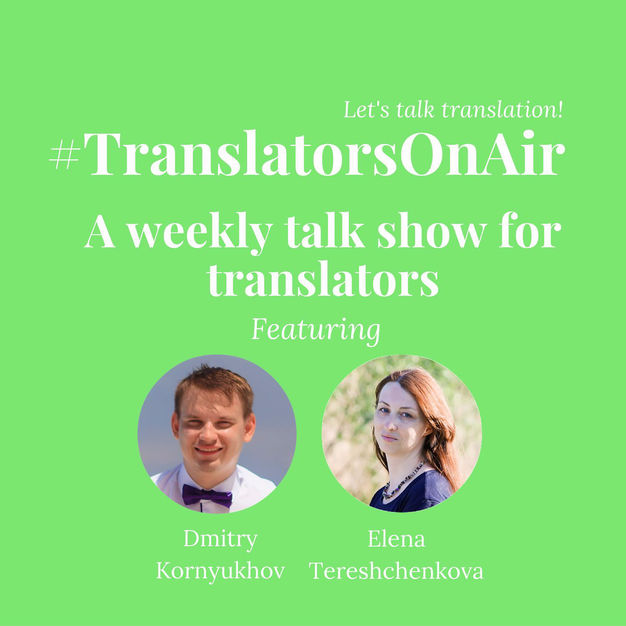 Translators on Air
Translators on Air
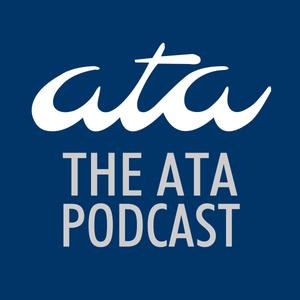 The ATA Podcast
The ATA Podcast
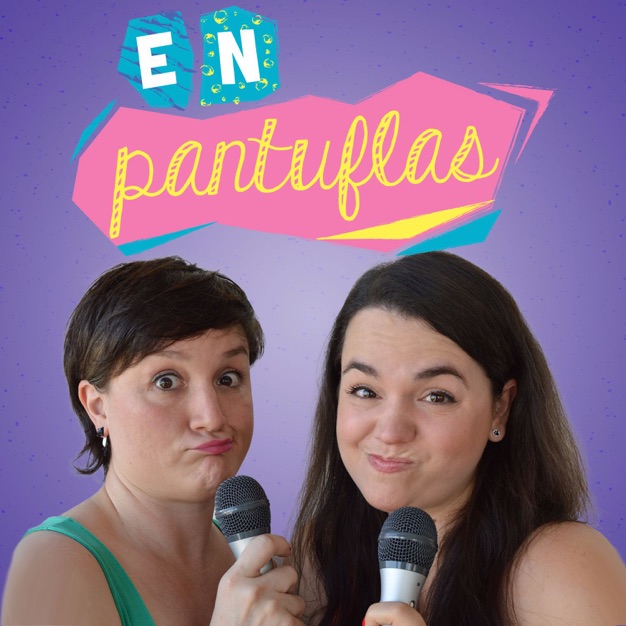 En Pantuflas
En Pantuflas
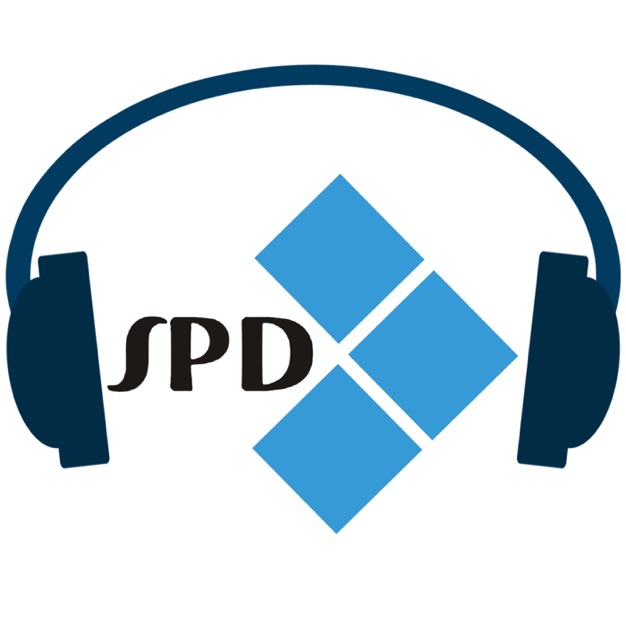 ATA SPD's Podcast
ATA SPD's Podcast
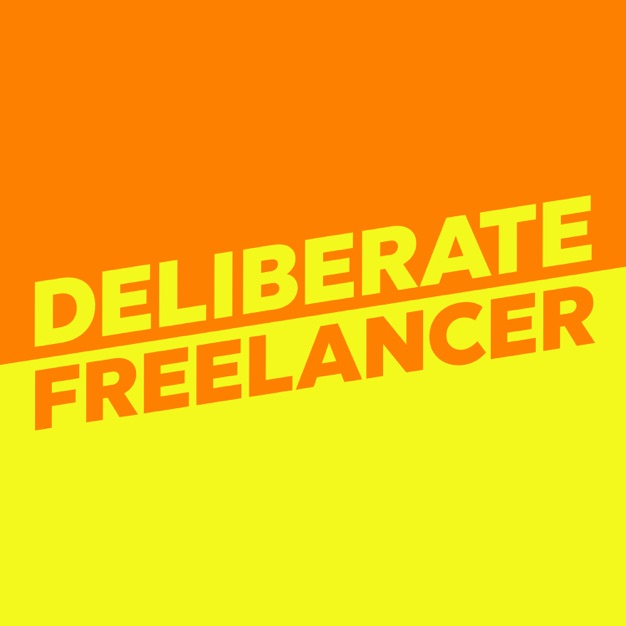 Deliberate Freelancer
Deliberate Freelancer